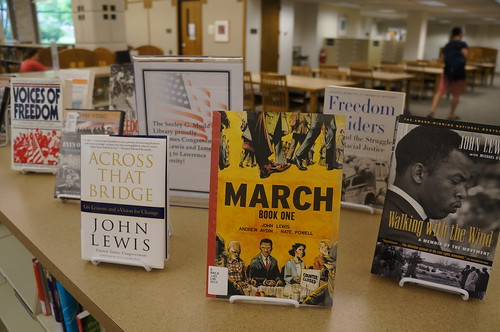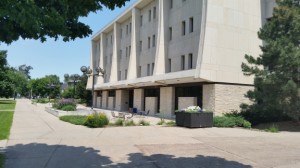Whether she’s studying English or biology, we love to see Terese Swords’ smiling face in the Mudd! This Midwestern senior may be winding down her career at Lawrence, but she’s still using the library full force. Read on to learn more about Terese, her research and why she loves the library.
What library materials and resources have been the most useful to you in pursuing your research, Terese?
I frequently use ILL to gain access to both electronic journal articles as well as PDFs of books. The main collection of books within the library, especially regarding 18th century credit economies, has also been extremely useful.
What would you like your fellow students to know about the Mudd Library?
It is a great resource and can allow you to gain a better understanding of questions (in any academic field) that interest you.
Also, having a student office in the library is extremely useful when pursuing large research projects, because it allows for both a quiet study space as well as a secure location to keep an immense amount of research materials.
The Mudd, and its staff, are awesome!
What are you researching?
I am researching many things!
For my honors project in English, I am researching the representation of 18th century economies in two of Daniel Defoe’s works: Robinson Crusoe and Roxana.
For my biology senior capstone, I am writing a review paper analyzing how the parasitic protozoan Toxoplasma gondii is able to manipulate its intermediate rat host and how Toxoplasma, which can infect humans and cause the disease toxoplasmosis, may be manipulating our behavior!
I am planning to use my biology research on Toxoplasma as content for a radio script that I am going to be writing and producing in the spring.
What are you hoping to learn or gain from this research?
For my honors project in English I am hoping to gain a deeper understanding of capitalist economies in the 18th century and how the South Sea Bubble’s burst drastically influenced the social and economic thought of the time. I am also looking to understand where critics stand on the issue of economic representation in Daniel Defoe’s works so I can enter into a conversation with them within my paper.
For my biology capstone, I am hoping to further understand the mechanisms by which Toxoplasma gondii is able to manipulate its hosts as well as the global health implications of the disease toxoplasmosis in humans.
Why do you think this research is important?
I believe that both research topics are important because both projects look to further answer/understand gaps present within the critical literature in each respective field.
How did you become interested in this line of research?
I became interested in researching 18th century credit economies after taking Dr. Barnes class “Gender and the Enlightenment” last winter, where I was first introduced to Daniel Defoe and his work Roxana. Since then, I have not stopped thinking about economic representation within Defoe’s works and other literary/artistic works post South Sea Bubble.
After taking parasitology with Dr. Humphries, I amazed at the idea that Toxoplasma gondii, a parasite that is estimated to be infecting ¼ of the population of the US above the age of 12, could be manipulating mammals’ behavior. Since then, for my capstone, I have been researching how humans, a dead end host for the parasite, may also experience behavioral changes due to infection.
What are your plans after graduation?
I am taking a gap year or two before attending graduate school or law school (I haven’t decided yet). For my gap year, I am applying to boarding school programs where I will have the opportunity to teach high school students while earning a masters degree in education. I am also planning on applying to pharmaceutical companies.
My job search is just about as broad as my academic interests! I am hoping that work experience during my gap will help inform my decision of what higher education to pursue.
All the best to you, Terese! We think you’re awesome, too.





